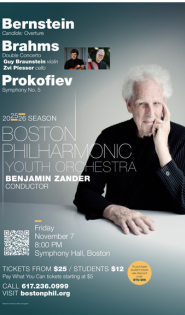Uplifting premiere highlights program by Boston Cecilia and Convivium Musicum

Michael Barrett conducted Boston Cecilia and Convivium Musicum in the world premiere of Gregory W. Brown’s Land-Locked Saturday night at First Church in Cambridge. Photo: George Imirzian
Listening to the music of Gregory W. Brown is like experiencing the best of two distinct worlds. While his choral works reflect the styles of Josquin, DuFay, and Palestrina, Brown’s sound is thoroughly modern, with bristly dissonances tossed into the mix for beguiling effect.
Yet Land-Locked, commissioned by Boston Cecilia and Convivium Musicum, reveals a romantic sensibility. Heard in its world premiere Saturday night under Michael Barrett’s direction, the work brought spiritual uplift to a wide-ranging program offered by both ensembles at the First Church in Cambridge.
Brown rose to prominence by exploring subjects that walk the wire between the sacred and profane. His Missa Charles Darwin combines texts from the Origin of Species and The Descent of Man with traditional liturgical prayers for arresting musical results. (The work was also the inspiration for his brother Dan Brown’s thriller Origin.)
But Land-Locked takes its cue from nature. Text by Celia Thaxter, a nineteenth-century Bostonian, expresses a longing for the sea. Brown’s double-choir setting reveals the poem’s emotional and pictorial splendor. Tonally lush, the music builds slowly over its eight-minute span. Murmuring phrases gradually take on weight, and the texture comes alive in a flurry of interweaving lines. But it all breaks at work’s height as repeated phrases create momentary stasis. The final bars bring calm, though the poem’s longing endures.
Barrett’s clear direction resulted in a searching performance from the combined ensembles. Land-Locked is Brown’s strongest score to date, and the audience awarded the composer and performers with generous applause.
Joby Talbot’s “Santiago” offered greater dramatic intrigue. The final movement from the composer’s Path of Miracles, “Santiago” tells of the final leg of a spiritual pilgrimage to the Cathedral of Santiago in northwest Spain—the alleged resting place of St. James.
Like his film scores, Talbot’s music offers a tasteful mix of sweep and zest. Stuttering phrases and brief pauses vividly depict the anticipation and merriment on reaching a destination after a long journey. Later passages recall Medieval chant, others the sacred minimalism of John Tavener. A burst of rhythm creates sudden urgency that abates in the concluding bars.
Barrett struck a fine balance in managing the wide range of the double-choir forces, which run the gamut from solos to quartets and passages for full ensemble. Together, Boston Cecilia and Convivium Musicum realized the music’s sheer joy.
Their performance of Mikołaj Zieleński’s Magnificat for twelve parts was similarly expressive, at least for the most part. This polychoral motet channels the same energy as works by contemporaries Gabrieli and Schütz.
While Barrett drew attention to the abrupt shifts in texture and meter, the reading lacked for dynamic intensity. Climactic points felt flat, with the “Gloria Patri” failing to deliver a spirited conclusion.
The rest of the program, which featured each ensemble separately, fared better.
The warm tone and pristine diction of Convivium Musicum, which Barrett also leads as music director, made selections by Josquin, Vicente Lusitano, and Salamone Rossi sound thoroughly fresh and vibrant.
Josquin’s Ave Maria . . . virgo serena is a stellar example of vocal imitation and sacred word painting. Barrett’s broad tempo revealed every detail as the lines overlapped for supple harmonies.
Lusitano is remembered primarily as a Renaissance-era theorist. Yet the heavy chromaticism of Heu me Domine possesses a sense of tension and release well ahead of his time. The singers’ soulful conviction found the momentum in the work’s rising figures and warm resonances.
Rossi was the first composer to bring the polyphonic style of the high Renaissance to Jewish worship. A tasteful blend of imitation, chordal writing, and mixed meters make up the lyrical beauties of “Shir hamma’a lot Ashrei kol yere ‘adona,” his setting of Psalm 128. Barrett and the ensemble found both solace and vitality.
Barrett also led Boston Cecilia in selections of nineteenth and early-twentieth-century repertoire.
Fanny Mendelssohn-Hensel’s Schweigend sinkt die Nacht hernieder treats the end of the day as a metaphor for death. Yet the rich harmonies relay the peace that comes at the end of all things. Boston Cecilia sang the short work with prayerful reverence.
The dark lyricism of Samuel Coleridge-Taylor’s Summer is Gone, based on a poem by Christina Rossetti, mourns the passing of better times. Barrett coaxed a hushed intensity to reveal its nostalgic sorrow.
He did the same with Vaughan Williams’s Rest. Here, Rossetti’s text asks the earth to cradle the body of a deceased loved one. The conductor and the singers imbued the gently sweeping phrases with a eulogist’s tenderness.
Barrett is stepping down from his role as director of Convivium Musicum at the end of the season (he will stay on with Boston Cecilia). The sensitive performances he delivered Saturday offered a fitting and heartfelt farewell.
Barrett leads Convivium Musicum in music by Josquin, Palestrina, Lasso, and others 7 p.m. Sunday at Christ Church in Andover. convivium.org
Posted in Performances


